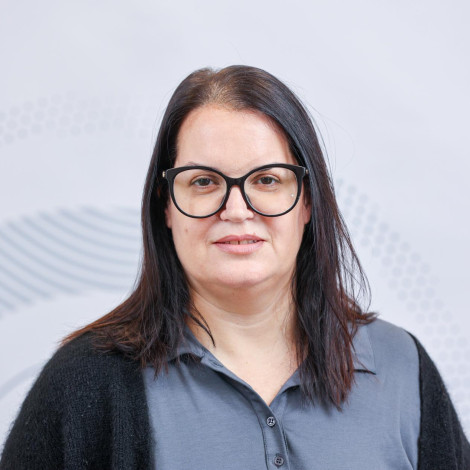
Prof. Sharon Ruthstein
CV
Sharon Ruthstein gained her B.Sc in Chemical Engineering from the Technion, Haifa, Israel. Then she continued her graduate studies in the Chemistry Department at Weizmann Institute of Science, Rehovot, Israel. She achieved her PhD under the supervision of Prof. Daniella Goldfarb. After graduating from the Weizmann Institute in 2008, she became an EMBO Postdoctoral Fellow at the University of Pittsburgh, where she worked under the supervision of Prof. Sunil Saxena.
Prof. Ruthstein joined the Department of Chemistry at Bar-Ilan University in October 2011. Her research is aiming to exploit biological pathways in human and bacteria cells, which involve metal ions, using pulsed Electron Paramagnetic Resonance Spectroscopy (EPR).
Educational Background
2008-2011 EMBO Long-term Post-doctoral Fellow at the
University of Pittsburgh, Department of Chemistry.
Advisor: Prof. Sunil Saxena.
2003-2008 Ph.D. in Chemistry, with Honors, Weizmann Institute of Science,
Israel. Advisor: Prof. Daniella Goldfarb.
2000-2003 M.Sc in Chemistry, with Honors, Weizmann Institute of Science.
1996-2000 B.Sc in Chemical Engineering, (summa cum laude),
Technion, Haifa, Israel.
Positions
2020 - present: Professor, Department of Chemistry, Bar-Ilan University.
2017 - 2020: Associate Professor, Department of Chemistry, Bar-Ilan University.
2011- 2017: Senior Lecturer, Department of Chemistry, Bar-Ilan University.
Awards and Fellowships
2017 ICS Young Scientist award
2017 ERC - STG
2015 Krill award (Wolf Foundation)
2008 EMBO Long-term Fellowship for post-doctoral studies.
2008 AAUW Post-doctoral fellowship – declined upon receiving the
EMBO fellowship.
2007 Dean's Excellence Prize for Ph.D. – Weizmann Institute of Science.
2007 JEOL Student Prize
2007 Auto Schwartz Prize – Weizmann Institute of Science.
2007 Wolf Foundation Fellowship for Excellent Ph.D. Students.
2004 Eshkol Scholarship for Ph.D. students, Jerusalem, Israel.
2003 Mention of Honor of the Knesset (The Israeli Parliament).
2003 Dean's Excellence Prize for M.Sc. – Weizmann Institute of Science,
1998 Sidney Goldstein Excellence Prize – Technion, Haifa, Israel.
Research
Protein structure and function, structural biology, magnetic resonance, metalloproteins.
More than 30% of all proteins in the cell exploit one or more metals to perform their specific functions, and over 40% of all enzymes contain metals. Metals are commonly found as natural constituents of proteins; however, many metal ions can be toxic when free in biological fluids. Hence, the human bodies as well as microorganisms have evolved considerable regulatory machinery to acquire, utilize, traffic, detoxify, and otherwise manage the intracellular and extracellular concentrations and types of metal ions. Despite the high regulation of metal ions in the human body, diseases such as Menkes, Wilson, Alzheimer’s, Parkinson’s and Prion’s have been linked with metal binding to proteins.
Dr. Ruthstein’s lab will look into some of the significant and least understood biological processes that are related to metal ion transportation and intracellular distribution, as well as unwanted processes due to high metal concentration or protein mutations. The aims are:
(i) To obtain structural information on intrinsically disordered N-terminal domain in metal transporters (such as Ctr1), in order to understand metal ion transportation to the cells.
(ii) To understand the metal binding mechanism of metal sensors in bacterial cells, in order to shed light on the metal regulatory machinery of the bacteria (CueR, CsoR).
(iii) To explore the copper transport and distribution mechanisms in human cells (from Ctr1 through Atox1 to Atp7b), in order to get to the core of the copper homeostasis mechanism.
(iv) To characterize the role of copper and mutations on the aggregation,folding of proteins, and protein-protein interactions in bacteria and human cells.
To comprehend such processes it is necessary to be sensitive to the structural changes that occur in the protein upon metal binding. The main biophysical tool that is used in the lab of Dr. Ruthstein’s lab is pulsed EPR spectroscopy. The power of EPR lies in the sensitivity to both atomic level changes and nanoscale fluctuations. EPR can characterize properties such as redox state and ligand geometry for different functional states of the protein. In addition, EPR can measure distances between paramagnetic probes up to 80 Å
Courses
Physical Chemistry II
Introduction to Electron Paramagnetic Resonance Spectroscopy
Physical Chemistry Lab
Research Group
Group members:
Ms. Adi Natan
Last Updated Date : 18/11/2025



